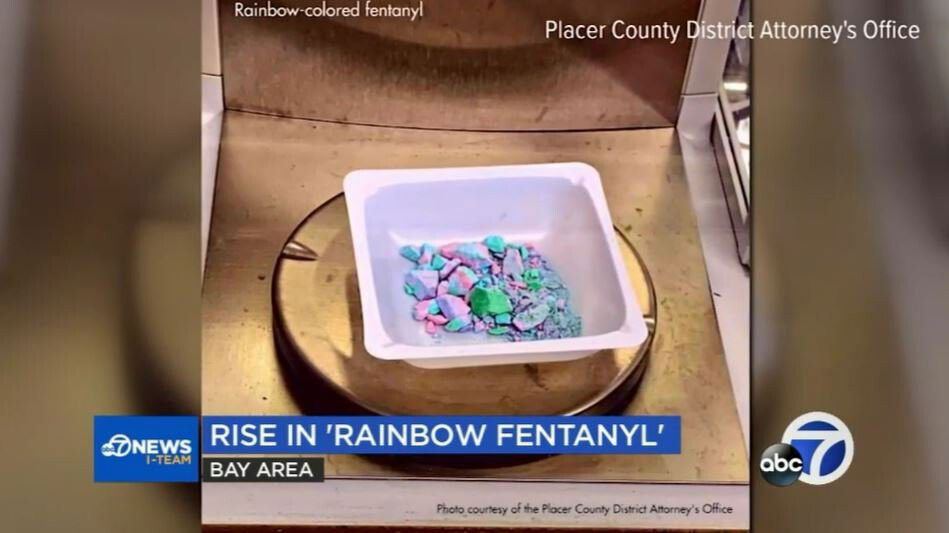DOJ warns of spike in ‘rainbow fentanyl’ as dealers target young teens

The Dept. of Justice is warning of a rise in what's called rainbow fentanyl.
By Stephanie Sierra
Click here for updates on this story
SAN FRANCISCO (KGO) — The Dept. of Justice is warning of a rise in what’s called rainbow fentanyl- a brightly colored version of the synthetic opioid that dealers are using to target teens and young adults.
An Oakland-based nonprofit FentCheck says Bay Area businesses are already seeing impacts.
“It’s becoming a big problem,” said the organization’s founders Alison Heller and Dean Shold.
FentCheck has partnered with more than 40 businesses across the Bay Area to distribute test strips that detect fentanyl in places like bars, night clubs, restaurants, book clubs, tattoo parlors, and thrift shops. According to Shold, there’s been a 46% increase in demand for test strips over the past four months.
And now, they may be seeing why.
“Rainbow fentanyl,” he said. “It’s enticing to young people and it’s working.”
Rainbow fentanyl also referred as ‘rainbow fent,’ comes in the form of brightly-colored pills or powder that looks like sidewalk chalk. Investigators say dealers are using the bold colors to attract young teens- in some cases pressing the drug into food like fruit loops.
Local Bay Area vendors say it appears to be working.
“We’ve heard young people have been going to the bars that we work with being very polite and upfront saying I am underage, I am not here to drink, I did see online from the FentCheck map that there are fentanyl test strips here and the staff are happy to bring you strips at the door,” Heller said.
Aside from the Bay Area, FentCheck has vendors in Los Angeles and cities in New York, North Carolina, Oregon, and Pennsylvania. Shold says businesses in these areas say there’s two types of rainbow fent dealers are distributing.
“One of which is pressed pills which are designed to be appealing to kids, that have some form of fentanyl in them but they are not pure fentanyl. They are the standard pressed pills,” said Shold. “The other is the rainbow chalklike substance that’s usually 100% pure fentanyl.”
Shold says some dealers are using it to identify a drug is laced with fent.
“So there’s now a huge market for fentanyl,” said Dr. Anna Lembke is a Stanford professor of psychiatry and addiction medicine.
Dr. Lembke says initially fentanyl infiltrated the heroin supply causing people to take it accidentally. But now, that’s changed.
“Now what we’re seeing is that people have gotten so addicted to opioids they are only seeking out fentanyl,” said Lembke, adding the synthetic opioid is 50 times more potent than heroin. “Especially young people.”
According to California’s Overdose Surveillance Dashboard, Fentanyl-related opioid deaths appear to be trending younger. In 2020, the highest rate of fentanyl-related overdose deaths in Alameda County involved people 30 to 34 years old. Whereas in 2021, that demographic shifted to people ages 25 to 29 years old.
“One possible explanation is that we’re now moving away from the population of individuals who got addicted to opioids through prescription opioids, and now transitioned to illicit opioids like heroin and fentanyl,” said Lembke. “Access to the drug is unbelievably overwhelming.”
Which is why Shold says always test- especially if you see any trace of color.
“Because it’s very likely that those little specs of color represent fentanyl,” he said.
FentCheck is partnering with UC Berkeley to distribute roughly 4,000 fentanyl test strips around certain areas of campus starting next week.
Please note: This content carries a strict local market embargo. If you share the same market as the contributor of this article, you may not use it on any platform.